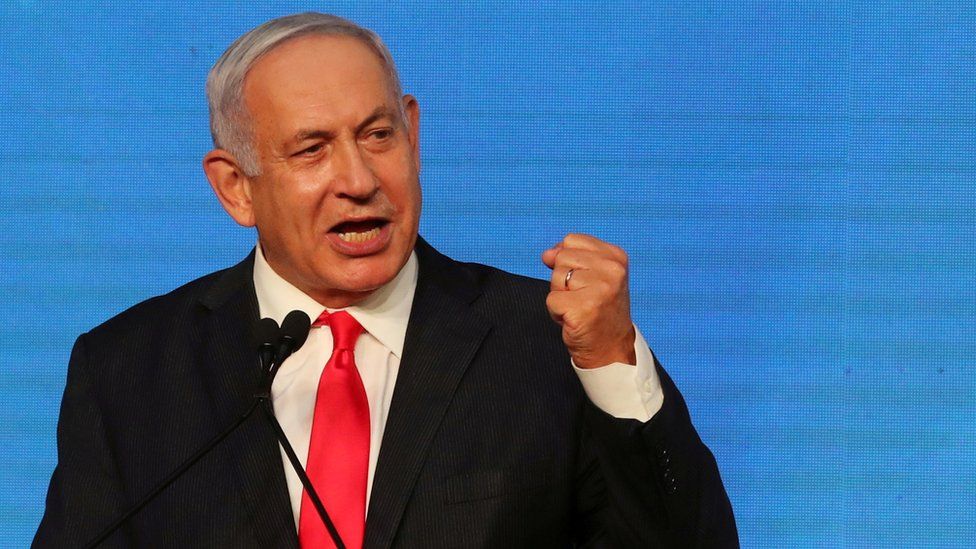Israeli opposition inch closer to deal to oust Netanyahu
- Published

Israeli opposition parties have moved closer towards forming a government that would bring to an end Benjamin Netanyahu's time as the country's longest serving prime minister.
Centrist party leader Yair Lapid is reportedly close to reaching a coalition agreement with the ultra-nationalist leader Naftali Bennett.
Leaders from Mr Bennett's party spoke in favour of the deal on Sunday.
Mr Lapid, 57, has until Wednesday to form a new coalition government.
Israeli media reports suggest both sides have inched closer towards a deal that would see Mr Bennett, 49, serve as prime minister for two years before being replaced by Mr Lapid for the second half of the term.
Mr Bennett is due to deliver a statement on Sunday evening in which he is expected to formally declare his support for the agreement.
His Yamina party hold a crucial six seats in the 120-member parliament that would give an opposition coalition of right-wing, centrist and left-wing parties a clear majority.
Mr Bennett met with Yamina leaders on Sunday and received their support for the coalition deal, a statement said.
But no one should count out Mr Netanyahu whose political survival instincts remain second to none, says BBC Middle East analyst Sebastian Usher.
The opponents of Mr Netanyahu, who is on trial for fraud, have little in common politically but are united in their desire to see his run in power come to an end.
The 71-year-old, who has been in power for 12 years and has dominated Israeli politics for a generation, fell short of a decisive majority at a general election in March. It was the fourth inconclusive vote in two years.
That result opened the door for Mr Lapid, a former finance minister who was given until 2 June to form a new coalition government after Mr Netanyahu failed to do so.
His Yesh Atid party came second to Mr Netanyahu's right-wing Likud at the last election.
Mr Lapid was initially given a 28-day mandate to form a government, but this was interrupted by the recent 11-day conflict in Gaza.
One of his potential coalition partners, the Arab Islamist Raam party, broke off talks because of the violence. There were also clashes in Israeli cities between mixed Arab and Jewish populations.
Two children from Gaza City and Israel describe their experience of the Israel-Gaza conflict
On Saturday night, Mr Netanyahu's Likud party made an offer to Mr Bennett and the leader of another potential coalition party to share the premiership in a three-way split.
However, his offer was rejected.
If Mr Lapid is unable to agree a coalition, Israelis could be going back to the polls again later for the fifth election in just two years.
Under Israel's electoral system of proportional representation, it is difficult for a single party to gain enough seats to form a government outright. Smaller parties are usually needed to make up the numbers needed for a coalition.
- Published5 May 2021
- Published6 April 2021
- Published22 March 2021